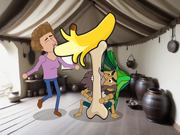佩
to respect / to wear (belt etc)
佩
=
亻
+
凧
:
Pinocchio (p) helps Rosa Luxemburg (亻) make a girdle in the Eiffel Tower's bathroom (ei4). He is standing on a small table (凧) and his holding a towel (凧), stretching out his arms so that it hangs flat in front of him. With a single complicated and elaborate hit of her saber (佩), Rosa Luxemburg cuts out an ornamented girdle (佩) and wears it (佩). Pinocchio thinks she's awesome and he admires (佩) her very much.
girdle ornaments
佩
=
亻
+
凧
:
Pinocchio (p) helps Rosa Luxemburg (亻) make a girdle in the Eiffel Tower's bathroom (ei4). He is standing on a small table (凧) and his holding a towel (凧), stretching out his arms so that it hangs flat in front of him. With a single complicated and elaborate hit of her saber (佩), Rosa Luxemburg cuts out an ornamented girdle (佩) and wears it (佩). Pinocchio thinks she's awesome and he admires (佩) her very much.
佩 character breakdown
"person" radical in Chinese characters (Kangxi radical 9)
亻
=
丿
+
丨
:
Mnemonic symbol: Rosa Luxemburg. She's quite radical, and her name starts with "r", just like "ren2". Also, 亻appears at the left-hand side of characters, and Rosa is a leftist as well.
Robinson Crusoe (r) and Rosa Luxemburg (亻) are having their favorite snacks in the encampment's kitchen: Rosa is eating a banana (丿) and Robinson is eating a dinosaur bone (丨).
Robinson Crusoe (r) and Rosa Luxemburg (亻) are having their favorite snacks in the encampment's kitchen: Rosa is eating a banana (丿) and Robinson is eating a dinosaur bone (丨).
Character component without intrinsic meaning
Characters with 佩 as component
佩
is not used as a component in another character.
Words with 佩
Sarah Palin (1964-), US Republican politician, State governor of Alaska from 2006
Gao Luopei or R.H. van Gulik (1910-1967), Dutch sinologist, diplomat and writer
Sentences with 佩
佩 currently does not appear in any sentence.

